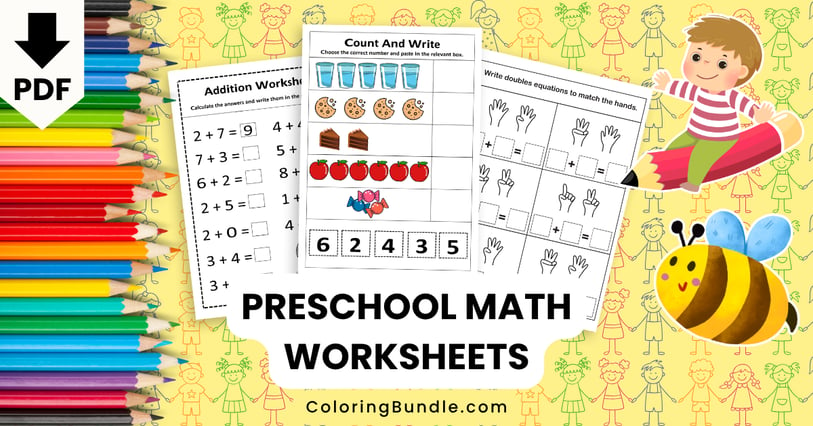Preschool Math Worksheets: Building Number Sense Through Engaging Activities


Early mathematical experiences lay the foundation for future academic success, making preschool math worksheets essential tools in early childhood education. These carefully designed resources introduce young children to fundamental numerical concepts through playful, age-appropriate activities that build confidence and curiosity. This comprehensive guide explores the most effective math worksheets for preschoolers, current trends in early mathematics education, and practical implementation strategies to nurture budding mathematicians.
The Importance of Early Math Exposure
According to research from the Early Math Collaborative at Erikson Institute, children with strong early math skills tend to perform better across all academic subjects throughout their education. Quality preschool math worksheets support this development by:
Introducing mathematical vocabulary and concepts in accessible ways
Building number recognition and counting skills
Developing one-to-one correspondence understanding
Creating opportunities for pattern recognition and logical thinking
Fostering positive attitudes toward mathematics from the beginning
Essential Types of Preschool Math Worksheets
Number Recognition and Counting Worksheets
These fundamental worksheets help children identify numerals and connect them to quantities. Effective counting worksheets typically include:
Number tracing activities with directional arrows
Counting objects and writing the corresponding numeral
Matching numbers to the correct quantity of items
Number coloring activities that reinforce recognition
Connect-the-dots activities that follow numerical sequences
The National Association for the Education of Young Children emphasizes that understanding the connection between symbols (numerals) and their meaning (quantities) forms the foundation of mathematical thinking.
Shape Recognition and Geometry Worksheets
Geometric understanding begins with identifying and categorizing shapes. Quality shape worksheets for preschoolers include:
Basic shape identification activities (circle, square, triangle, rectangle)
Shape tracing and drawing practice
Shape sorting and classification exercises
Shape hunt activities connecting geometry to real-world objects
Simple pattern blocks and tangram-inspired activities
These worksheets help children recognize that our world is composed of shapes with specific properties and relationships.
Pattern Recognition Worksheets
Pattern recognition is a cornerstone of algebraic thinking. Effective pattern worksheets for preschoolers feature:
Simple AB patterns to identify and continue
Pattern completion with shapes, colors, or objects
Creating original patterns with given elements
Identifying the "rule" in simple patterns
Real-life pattern connections (days of week, seasons, etc.)
Research from Stanford University indicates that early pattern recognition skills predict later success in mathematics.
Comparison and Measurement Worksheets
These worksheets introduce the concepts of relative size, quantity, and measurement. Look for activities that include:
Comparing objects by size (bigger/smaller, taller/shorter)
Ordering items by length, height, or weight
Simple graphing activities based on counting and comparison
More than/less than/equal to concepts with visual supports
Non-standard measurement activities (measuring with blocks, paperclips, etc.)
These concepts build the foundation for more advanced mathematical operations and data analysis.
Beginning Operations Worksheets
Simple addition and subtraction concepts can be introduced through visual models. Appropriate worksheets might include:
Adding objects with sums to 5 (gradually increasing to 10)
"Take away" activities with visual supports
Combining and separating small groups of objects
Story-based problem-solving with simple scenarios
Number bonds and part-whole relationships
These activities build conceptual understanding before formal arithmetic instruction begins.
2025 Trends in Preschool Math Worksheets
Current approaches to early mathematics reflect evolving understanding of how young children learn:
Integrated Learning Through Play
Modern math worksheets often incorporate playful elements that make learning feel like a game:
Dice and spinner activities that combine chance with counting
Math-focused board game printables
Cut-and-paste activities that combine fine motor practice with mathematical concepts
Sticker-based counting and number recognition
Dramatic play extensions (store play with price tags, measurement in pretend cooking)
Cross-Curricular Connections
Effective worksheets connect mathematics to other domains:
Literacy-math integration through counting stories
Science connections through measurement and classification
Art-math fusion through shape composition and pattern creation
Social studies links through calendar concepts and graphing preferences
Personalized Learning Paths
Recognizing that children develop at different rates, many worksheet collections now offer:
Multiple difficulty levels for each concept
Scaffolded progression from concrete to abstract understanding
Visual supports that gradually fade as skills develop
Self-checking features that build independence
Best Practices for Using Math Worksheets with Preschoolers
To maximize the educational value of preschool math worksheets:
Connect to Concrete Experiences
The National Council of Teachers of Mathematics recommends that young children experience mathematics first with physical objects before moving to pictorial representations and finally to abstract symbols. For each worksheet concept:
Introduce the skill first with manipulatives (blocks, counters, etc.)
Move to the worksheet with pictures representing objects
Gradually transition to more abstract representations
Circle back to real-world applications of the concept
Maintain Appropriate Pacing
Respect each child's developmental readiness:
Limit worksheet sessions to 5-10 minutes for young preschoolers
Watch for signs of frustration and provide support as needed
Revisit concepts regularly rather than expecting mastery in one session
Celebrate effort and progress rather than perfect completion
Use Thoughtful Questioning
Enhance worksheet activities with prompts that develop mathematical thinking:
"How do you know that?"
"Can you find another way to solve this?"
"What do you notice about these numbers/shapes?"
"What might happen if we...?"
"How could we check our answer?"
Conclusion: Nurturing Mathematical Minds Through Quality Resources
Quality preschool math worksheets provide structured opportunities for children to explore foundational mathematical concepts in engaging ways. When used thoughtfully as part of a comprehensive approach to early education, these resources help children develop the number sense, spatial reasoning, and logical thinking skills that contribute to mathematical confidence and competence.
By selecting developmentally appropriate worksheets, following best practices for implementation, and complementing paper activities with hands-on experiences, you create an optimal environment for mathematical discovery that will serve children throughout their educational journey.
Subscribe to our newsletter
Enjoy exclusive special deals available only to our subscribers.
